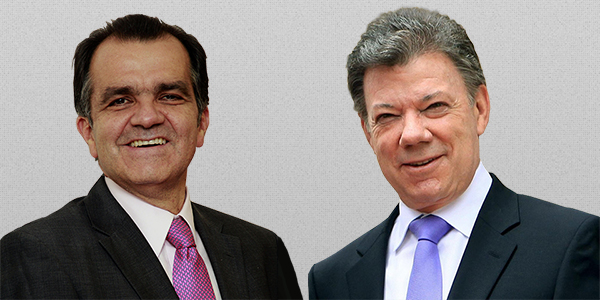 As the runoff election set for June 15 approaches, Bogota has become critical for the two opposing candidates, with its potential registered electorate of 5,204,000, according to data from the electoral register.
As the runoff election set for June 15 approaches, Bogota has become critical for the two opposing candidates, with its potential registered electorate of 5,204,000, according to data from the electoral register.
Abstentions in the capital during the first round of voting on May 25 totaled 50 percent, one of the highest ever for the Bogota area.
As a result, both President Juan Manuel Santos, who is seeking a second term, for 2014-2018, as well as Oscar Ivan Zuluago from the Democratic Center, are concentrating their efforts on the capital in order to gather the greatest number of possible votes.
Santos, who finished the first round with 3.301.815 votes, was narrowly beaten by Zuluaga, with 3.759.971 and hopes to gain 800,000 additional votes by the runoff.
To his credit, he has the real and tangible accomplishment of peace talks with the FARC-EP guerrilla, with results never before obtained, in the form of three agreements: integrated agrarian development, political participation, and a resolution to the illicit drug problem; something that consensus suggests puts him at a point where there is no turning back.
In support of that concept, three members from the cabinet of Bogota mayor Gustavo Petro resigned their posts in order to work with the Progressive movement in the building of a National Front for Peace throughout the country, despite their substantial disagreements with Santos´ general policy.
The former district secretaries for Health and Social Integration, Aldo Cadena and Jorge Rojas, said that their basic aim is to “achieve the peace” that Colombia needs, on June 15.
The Patriotic Union and the political and social movement Patriotic March are working in the same direction.
Santos also received the support of Professor Antanas Mockus, his opponent in the 2010 presidential campaign, and also mayor of Bogota from 2001 to 2003. Last Friday he signed onto a document that expressed his commitment to vote for Santos.
Among other reasons, he pointed out that “the peace process that Santos began is serious. It has taken into account lessons learned, and has made the greatest strides in the last 50 years of the FARC’s existence.”
Although the Green Alliance and the Democratic Pole decided to leave their members free to decide their votes (including whether to abstain or submit a blank ballot), a large portion of the Alliance and even the Pole have said they will vote for the peace process begun by the current president.
Intellectuals and opinion leaders have said much the same, like the journalist Alfredo Molano, who said “I will take the opportunity to vote in favor of continued negotiations in Havana with the FARC, and by extension, the ELN. Therefore, I am casting my vote for Juan Manuel Santos. To leave the ballot blank or abstain would be a vote in support of war and bloodshed.”
Written by Anubis Galardy via PL
